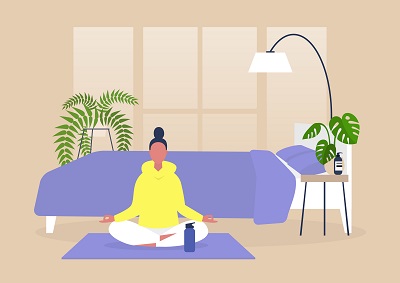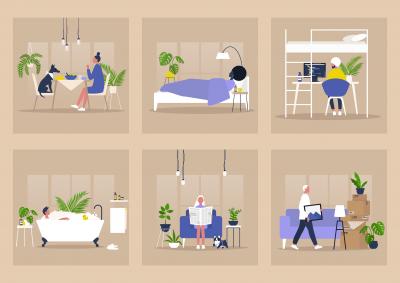Importance of Self-Care to the Mental Health of BIPOC Communities
Importance of Self-Care to the Mental Health of BIPOC Communities

Note: Tiara Johnson is an ADAA communications consultant and not an ADAA member or a mental health professional.
Self-care can often be seen as a privilege that is not available to those within BIPOC communities. As many people within these communities are products of systematic oppression, and racism and are used to putting others' needs before their own, the idea of self-care is viewed as a luxury that is not afforded to them.
The Global Self-Care Federation defines self-care as:
“...the practice of individuals looking after their own health using knowledge and information available to them. It is a decision-making process that empowers individuals to look after their own health efficiently and conveniently.”1
Communities of color often have cultures that are rooted in the importance of community and family. Therefore, people of color are used to taking care of others and can find it difficult to prioritize self-care. However, self-care can be a powerful mental health tool for fostering mental well-being.
People of color have experienced trauma at an alarming rate since the beginning of the pandemic. In the past two years, these communities have dealt with various issues such as racial trauma, economic uncertainties and even depression or anxiety caused by isolation at an increased rate. Experiencing any combination of these compounding traumas can have an impact on the mental, emotional and even physical well-being of people of color. Self-care is a necessary response to traumatic experiences.
Practicing self-care allows one to find activities or techniques that aid in personal wellness. There are various forms of self-care including both mental and physical health self-care (2). Every form is equally important in achieving mental and physical well-being. Physical self-care includes exercising and practicing healthy eating and sleeping habits. Mental health self-care includes practicing brain-stimulating activities and healthy mental behaviors such as painting, journaling, or even unplugging from the daily routine to watch a movie or listen to a favorite song. The beauty of practicing self-care is that there is no perfect way to achieve it.
Recognizing Burnout
 Sometimes, people of color ignore or are unable to recognize signs of burnout. Burnout is defined as a state of emotional, physical, and mental exhaustion caused by excessive and prolonged stress (3). However, communities of color can be hesitant to acknowledge burnout because of the fear or stigma of looking or feeling weak.
Sometimes, people of color ignore or are unable to recognize signs of burnout. Burnout is defined as a state of emotional, physical, and mental exhaustion caused by excessive and prolonged stress (3). However, communities of color can be hesitant to acknowledge burnout because of the fear or stigma of looking or feeling weak.
Burnout within communities of color can come from many socioeconomic stressors including racial trauma or feeling overworked and undervalued in workplaces and can affect lives in various ways. Burnout can look different based on the person but can be characterized by symptoms of extreme anxiety, stress, detachment, lack of creativity and reduced productivity over a long period of time (4).
Sometimes it can be difficult to differentiate between signs of extreme stress and burnout. Stress can be an early indicator to the body of potential burnout. However, burnout is a gradual process that does not happen overnight. When signs of burnout begin to show, try to reach out to those closest to you for support or even re-evaluate priorities and attempt to find a better work/life balance. The signs and symptoms are subtle at first but become worse as time goes on.
The practice of self-care is important in helping to reduce stress and burnout. Ultimately, it can provide a sense of relaxation and comfort while decreasing stress and building emotional and mental strength. It can benefit communities of color by allowing people to practice mental, emotional and physical wellness even if they are fearful of visiting with a health professional. However, if you feel that the burnout or stress you are experiencing isn’t being eased by practicing self-care, you might need to consider speaking with your primary care provider or seeking therapy to determine if there is a more serious underlying condition such as anxiety or depression.
Self-care is about prioritizing yourself and your needs, and identifying the practices and routines that support your personal health and wellness (5). It can ultimately provide an increase in self-worth, a sense of belonging, and reduce stress levels. It is important to check in with yourself and recognize when things may be changing mentally, emotionally and physically. So, the next time the feelings of stress burnout being to loom over, remember to find time to prioritize yourself and practice self-care.
Footnotes:
- https://www.selfcarefederation.org/what-is-self-care
- https://www.verywellhealth.com/self-care-definition-and-examples-5212781#toc-what-types-of-self-care-are-there
- https://www.helpguide.org/articles/stress/burnout-prevention-and-recovery.htm
- https://ada.com/signs-of-burnout/
- https://www.counseling.org/news/aca-blogs/aca-counseling-corner/aca-counseling-corner-blog/2021/07/07/celebrating-self-care-during-bipoc-mental-health-month
















